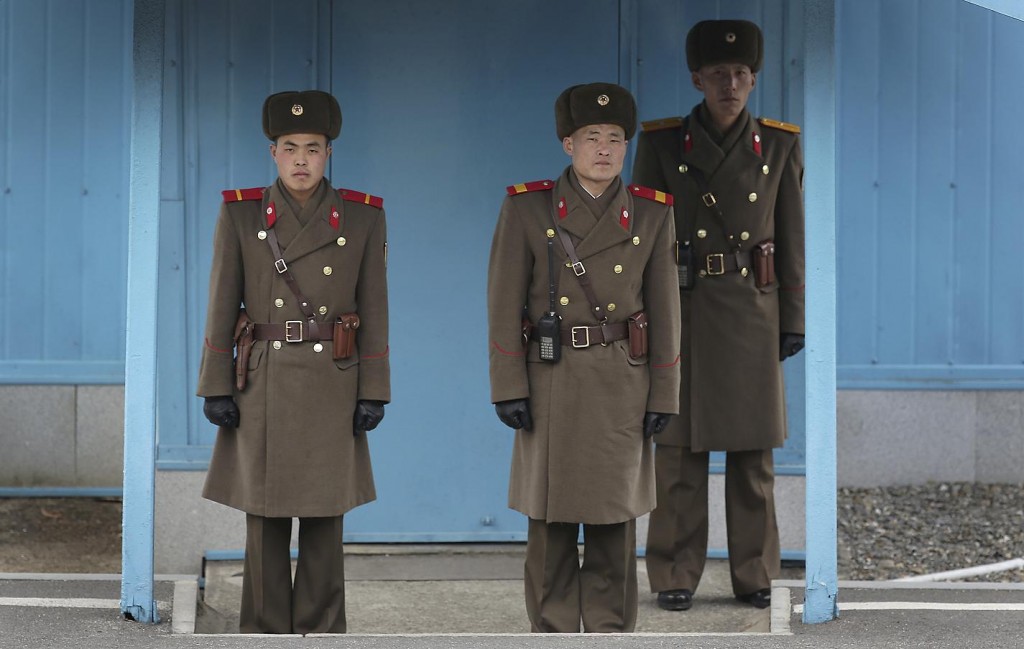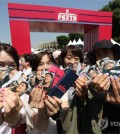
North Korean soldiers guard the truce village of Panmunjom at the Demilitarized Zone (DMZ) which separates the two Koreas on Monday, Feb. 22, 2016, in Panmunjom, North Korea. Though the world’s most fortified border can often seem like a tourist trap, drawing throngs of camera-happy visitors on both sides every year, to the military-trained eye the Cold War style standoff along the DMZ is an incident waiting to happen. And with tensions between Seoul, Pyongyang and Washington, this is one of those times when that’s more true than ever. (AP Photo/Wong Maye-E)
PANMUNJOM, North Korea (AP) — Tensions have increased significantly along the Demilitarized Zone since North Korea’s recent nuclear test and rocket launch, a North Korean military official told The Associated Press on Monday, adding that while he could not comment on operational details, “the reality is that it is touch and go.”
Though parts of the world’s most fortified border can seem like a tourist trap, drawing throngs of camera-happy visitors on both sides every year, to the military-trained eye the Cold War-style standoff along the 257-kilometer (160-mile) DMZ — established when the 1950-53 Korean War ended in an armistice, not a peace treaty — is an incident waiting to happen.
That’s now truer than ever, the North Korean officer said, as tensions are escalating between Pyongyang, Seoul and Washington. Thousands of U.S. troops are deployed in South Korea and units based around the DMZ have the motto “Be Ready to Fight Tonight.”
“People come here and they think it’s like a resort. But if you know it better, you know how dangerous it is,” Lt. Col. Nam Dong Ho of the North Korean People’s Army said in Panmunjom, the truce village where the armistice was signed.
Nam said tensions have increased significantly since the nuclear test in January and rocket launch earlier this month. “Something could happen at any time,” he said.
To stand on the North Korean side of the Demilitarized Zone is almost otherworldly.
After crossing through military checkpoints and passing roadside concrete structures rigged to detonate and keep any vehicles from passing — defenses that are also common in the South — the air is peaceful and fresh, and birds can be heard chirping as they fly over a carefully manicured landscape dotted with rock monuments and meticulously maintained historical buildings.
But closer to the Demarcation Line that marks the actual border, soldiers stand rigidly on guard, armed and intimidating, often just a few steps away from their South Korean counterparts.
On Monday, the surreal feeling at the Demarcation Line was heightened by the absence of anyone — soldiers or civilians — visible on the South’s side.
South Korea halted tours to its side of the DMZ the day after the Jan. 6 nuclear test, when it also announced it would resume cross-border propaganda broadcasts, which have in the past brought strong recriminations from North Korea. The tours have gradually resumed. A popular observatory where people can catch a glimpse into the North via binoculars was set to reopen Tuesday.
Along with restarting the broadcasts, South Korean President Park Geun-hye responded to the North’s nuclear test and launch by shutting down a joint industrial park in Kaesong, a city just north of the DMZ, and telling the South Korean National Assembly that if North Korean leader Kim Jong Un doesn’t change his ways his regime will surely collapse — predictably outraging the North.
North Korea reacted by putting the industrial park under military control, cutting off emergency hotlines with Seoul and — through its state-run media — accusing Park of being a traitor and a “senile granny.”
“I don’t even want to utter her name,” Nam said. “I’m just a soldier so I don’t know how the situation has changed. But as the Kaesong industrial zone has been totally closed by South Korea, our people and army are getting more enraged.”
Nam said the broadcasts cannot be heard in Panmunjom during the day, which he suggested was because the South doesn’t want them to be heard by South Korean tourists.
“But when it’s quiet, late at night, you can hear them here,” he said.
North Korea says it is developing nuclear weapons for self-defense and has the sovereign right to launch satellites as part of a peaceful space program. But both are generally seen as violating longstanding United Nations resolutions. The U.N. Security Council is still discussing its response, but the United States, Japan and South Korea have already announced new sanctions on the already-heavily sanctioned North.
The standoff is likely to get worse before it gets better.
Keeping its own military profile high, the United States flew four stealth F-22 fighter jets over South Korea and reaffirmed it maintains an “ironclad commitment” to the defense of its ally after the rocket launch. Last month, it sent a nuclear-capable B-52 bomber over South Korea following the North’s nuclear test.
South Korea and the United States are expected to hold large-scale war games next month.
South Korea’s defense minister has said about 15,000 U.S. troops will take part in the annual exercises, double the number Washington normally sends. The two countries have also begun preparatory talks to deploy a Terminal High-Altitude Area Defense anti-missile system in South Korea.
That is strongly opposed by neighboring powers China and Russia, since the radar would allow Washington to reach well into their territory as well.
Nam, the North Korean officer, said he remains focused on his duties. But he added that, now that North Korea says it has an H-bomb — a claim disputed by some outside experts — the U.S. might be better advised to focus on negotiating a peace treaty to formally end the Korean War.
“On the international stage, the U.S. talks about peace,” he said. “But it should not interfere in the affairs of other countries.”

















Horangih Gomtoki
February 22, 2016 at 8:53 PM
US wants to keep South Korea as its puppet-whore forever.
Yes, North Korea is ruled by a terrible regime, but things have been economically improving and normalizing little by little over the yrs, and there may come a day when North Korea and South Korea might move toward greater peace. That is what US does not want.
But US ramps up tensions because a united Korea means it will grow more independent and closer to China. So, US wants to keep South Korea at war footing against the North forever.
True, North developed nukes, but it is understandable because US has acted aggressive and crazy all over the world. US made up lies about WMD in Iraq and totally destroyed that country. Even though Gaddafi gave up his WMD, US destroyed Libya and the place is a hellhole. US also aided terrorists in Syria to damage Assad. US also instigated the coup in Ukraine.
US is also urging Europe to take in millions of Muslim refugees displaced by US warmongering in the Middle East. Jews who rule the US take no responsibility.
US is ruled by crazy Zionist supremacists.
US sees South Korea as its whore-dog in Asia. And to keep the South Korean dog as the property of its US master, it is in the US interest to keep increasing tensions.
And South Koreans have fallen for this nonsense. South Korea elites are craven cowards and dogs of the US empire. South Korean masses are dummies addicted to stupid soap operas and trashy K-pop that only promotes narcissism and greed.
Why can’t US make peace with North Korea like Russia and China made peace with the US? Because US wants to keep South Korea as its pet dog.
Why shouldn’t North Korea keep nukes as defensive measure?
US has shown, again and again, that it cannot be trusted.
Just look what happened to Gaddafi after he gave up his weapons and sought peace with the West. Why should North Korea trust the US?
Besides, Israel has nukes. And Israel is a state created by ethnic cleansing of Palestinians who ended up like Koreans under Japanese colonization.
US is the main imperialist power in the world.
If American Masters order Korean dogs to kill fellow Koreans, will Koreans comply? Are Koreans really a bunch of dogs who will kill fellow Koreans at the behest of their American masters?